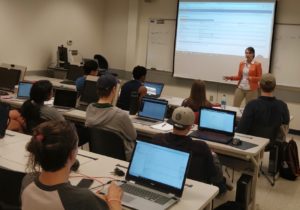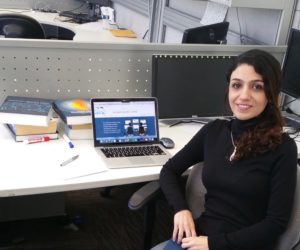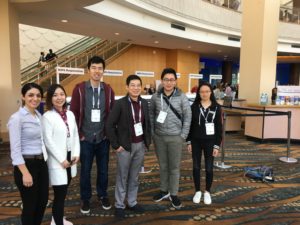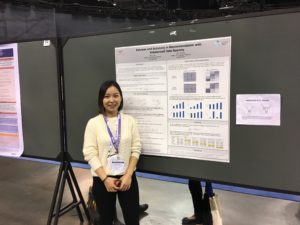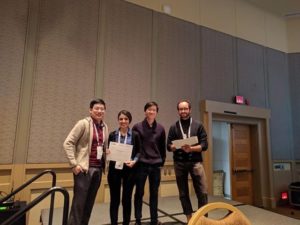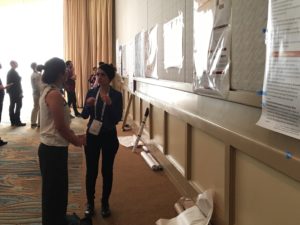Congratulations to our Ph.D. and master’s degree Spring graduates at the Discovery Analytics Center!
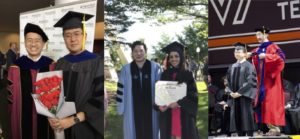
DAC graduates include (left to right): Xuchao Zhang with advisor Chang-Tien Lu in the National Capital Region; and Elaheh Raisi with Bert Huang and Yufeng Ma hooded by Ed Fox, both in Blacksburg.
The Discovery Analytics Center is pleased to announce that five of their Ph.D. and four of their master’s degree students celebrated graduation from Virginia Tech last weekend at Commencement ceremonies in Blacksburg and in the National Capital Region.
“It is always bittersweet to bid our students farewell, but we wish them all the best. We know and appreciate how hard they have worked to achieve the high goals they set for themselves and look forward to following their successful careers in academia and industry,” said Naren Ramakrishnan, the Thomas L. Phillips Professor of Engineering and director of the center.
Ph.D. graduates
Sorour E. Amiri, advised by B. Aditya Prakash, received a Ph.D. in computer science.
Her research interests are large-scale graph mining, data mining, and applied machine learning and the title of her dissertation is “Task-specific Summarization of Networks: Optimization and Learning.” She is joining the Google search ad team.
Minghan Chen, co-advised by Layne Watson, received a Ph.D. in computer science. Her research interest is computational cell biology and her dissertation title is “Stochastic Modeling and Simulation of Multiscale Biochemical Networks.” She joins the Computer Science Department at Wake Forest University as assistant professor.
Yufeng Ma, co-advised by Weiguo (Patrick) Fan and Edward Fox, received a Ph.D. in computer science. Ma’s research interests are computer vision, Natural Language Processing (NLP), and deep learning and his dissertation title is “Going Deeper with Images and Natural Language.” Ma is joining Verizon Media (Yahoo! Research) as a research scientist focusing on personalized recommendations.
Elaheh Raisi, advised by Bert Huang, received a Ph.D. in computer science. Her research interests are machine learning, weakly supervised learning, and computational social science and her dissertation title is “Weakly Supervised Machine Learning for Cyberbullying Detection.”
Xuchao Zhang, advised by Chang-Tien Lu, received a Ph.D. in computer science. His research interests are data mining, machine learning, and Natural Language Processing (NLP) and his dissertation title is “Scalable Robust Models Under Adversarial Data Corruption.” Zhang joins NEC Labs America as a researcher. In that position he will work to fully understand the dynamics of big data from complex systems; retrieve patterns to profile them; and build innovative solutions to help end user managing those systems.
Master’s graduates
Raja Venkata Satya Phanindra Chava, advised by Edward Fox, received a master of engineering degree. His research interests are text summarization using deep learning and Natural Language Processing (NLP) and his project title is “Natural Language Processing Techniques for Comprehending Legal Depositions.” Chava is joining Walmart in Reston, Virginia, as a software engineer and will work on big data analysis to manage the supply chain and personalize the customer’s shopping experience.
Supritha B. Patil, advised by Edward Fox, received a master of science degree in computer science. Patil’s research interest is Natural Language Processing (NPL) and her thesis title is “Analysis of Moving Events Using Tweets.” She will be working as a software developer.
Adithya Upadhya, advised by Edward Fox, received a master’s in computer science. His research interests are machine learning and high performance computing and his project title is “A General Web Platform Summarizing Text and Documents.”
Xinfeng Xu, advised by B. Aditya Prakash, received a master’s degree in computer science. His research focused on modeling and predicting incidence and the title of his thesis is “Modeling and Predicting Incidence: Critical Systems Failures and Flu Infection Cases.” He also received the 2019 MS Research Award from the Department of Science. Xu is also a Ph.D. student in physics in the College of Science and will continue his research in that field.
